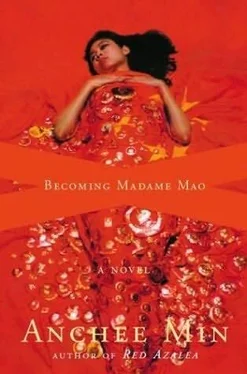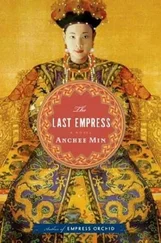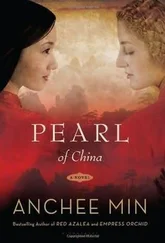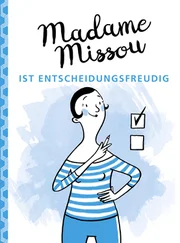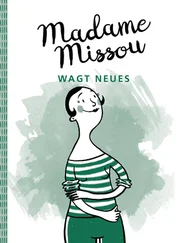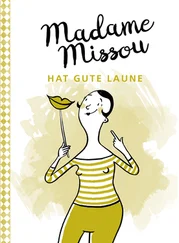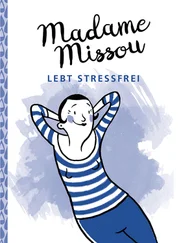Anchee Min - Becoming Madame Mao
Здесь есть возможность читать онлайн «Anchee Min - Becoming Madame Mao» весь текст электронной книги совершенно бесплатно (целиком полную версию без сокращений). В некоторых случаях можно слушать аудио, скачать через торрент в формате fb2 и присутствует краткое содержание. Жанр: Современная проза, на английском языке. Описание произведения, (предисловие) а так же отзывы посетителей доступны на портале библиотеки ЛибКат.
- Название:Becoming Madame Mao
- Автор:
- Жанр:
- Год:неизвестен
- ISBN:нет данных
- Рейтинг книги:4 / 5. Голосов: 1
-
Избранное:Добавить в избранное
- Отзывы:
-
Ваша оценка:
- 80
- 1
- 2
- 3
- 4
- 5
Becoming Madame Mao: краткое содержание, описание и аннотация
Предлагаем к чтению аннотацию, описание, краткое содержание или предисловие (зависит от того, что написал сам автор книги «Becoming Madame Mao»). Если вы не нашли необходимую информацию о книге — напишите в комментариях, мы постараемся отыскать её.
Becoming Madame Mao — читать онлайн бесплатно полную книгу (весь текст) целиком
Ниже представлен текст книги, разбитый по страницам. Система сохранения места последней прочитанной страницы, позволяет с удобством читать онлайн бесплатно книгу «Becoming Madame Mao», без необходимости каждый раз заново искать на чём Вы остановились. Поставьте закладку, и сможете в любой момент перейти на страницу, на которой закончили чтение.
Интервал:
Закладка:
What has become of me? the actress asks herself. Fairlynn occupies a seat in the Party's convention while she, as Mao's wife, can't even attend its opening.
Fairlynn sits among the delegation in the front row and is voted a speaker for the nation's intellectuals. During a break Fairlynn pays a visit to Madame Mao Jiang Ching. She congratulates her on her husband's rise to power and asks if Madame Mao compares herself to Madame Roosevelt. Fairlynn describes Madame Roosevelt, her achievement in American politics and Western history.
The wife of Mao listens as she washes her husband's and children's clothes in a bucket. The water is freezing. She washes the bowls, woks and scrubs the chamber pot. Her hands are swelling with frostbite. The soap slips through her fingers.
One night I try to discuss Madame Roosevelt with Mao. You are not Madame Roosevelt. He kicks off his shoes and blows out the candle.
Suddenly I am depressed. For the rest of the month I try to read.
But there is no way I can concentrate. An incident almost took place as I neglected my duty-Nah nearly fell into the manure pit-and it makes me put down the books.
The tailor comes to accompany me, but I send her back. I no longer want to hear the news.
Mao holds small meetings at home. He doesn't tell me ahead of time. He doesn't tell me who will be coming either. It's his style. He just sends Little Dragon for them on his terms. It can be three o'clock in the morning or midnight. They are expected to share a meal and discuss battles. I am supposed to put out food and go to war in the kitchen. Sometimes a cook or the guards help me. But it is my job to clean up afterwards.
I am playing a strange role: a queen who is a maid.
At the convention Mao is elected the Party's sole boss. Liu Shao-qi, who has built the Communist network in Chiang Kai-shek's white territories, is voted the second boss. Vice Chairman Liu Shao-qi has praised Mao highly in his acceptance speech. Little Dragon excitedly updates me with the details of the convention. Liu Shao-qi mentioned Mao's name one hundred and five times! The guard expects me to be thrilled, but I can hardly hide my misery.
At bedtime, afterwards, the wife again asks if she can be given a seat at the convention. The husband switches the tone of his voice.
I can't give anybody a seat. One has to earn it.
The wife sits up. You don't think I have earned it?
He doesn't answer but makes a sigh.
She wipes her tears. Well, I need a chance to earn it then.
Mao produces a list of books for me to read. He is giving me the prescription he gave to Zi-zhen. Marx, Engels, Lenin, Stalin, The Three Kingdoms and The Record of History. But I won't be reading them. Not one of them. I already know what kind of pills are in his bottle. Not only do I refuse to become Zi-zhen, I am determined not to be a stagehand in his political theater.
As Jiang Ching tries to break onto his stage, Mao launches a movement called Rectify the Style of Work. The year is 1942. At first it is considered a routine political examination, then it turns into terror. All of a sudden "traitors," "reactionaries," and "Chiang Kai-shek's agents" are caught everywhere. What later surprises historians is that the movement is initiated by Mao and conducted by Kang Sheng-two masters of conspiracy who set up an imaginary plot against themselves.
The movement is narrowing. The focus has become the extermination of the enemies within. Panic sweeps through the entire base of Yenan. To make oneself stand out as a hard-core left-winger, a true Communist, one begins to put others down, even to accuse others as right-wingers. In the morning one can be thought of as a revolutionary activist, by noon an anti-Communism suspect, by evening an enemy. One can be seen in a day meeting forcing others to plead guilty, and in an evening meeting be oneself arrested and thrown into a dark confession room.
The drill for the movement is Ren-ren-guo-guan -"a critical juncture everyone has to pass." The meetings are like chemical jars-when enemies are dipped, they show disease.
It doesn't matter that she is Madame Mao. To show the Party's fairness she will be checked no differently. She is told that it is her turn to dip herself in the chemical jar.
She is nervous. She worries about her background, in particular, her signature on Chiang Kai-shek's paper denouncing Communism. Although her friend Kang Sheng has instructed her on what to do she is still unsure.
Would you please attend my spot? she begs Kang Sheng.
When her day comes Kang Sheng is among the crowd.
Madame Mao Jiang Ching is put in the center of the room, spotted by the eyes of hundreds. She gives a self-evaluation as the format requests. Taking a deep breath she begins the process of convincing. The description is smoothly prepared and stated in graceful Mandarin. Her background could not be more pure: a child of feudalistic abuse, a young Communist in Qing-dao, her time in Shanghai as a left-wing actress devoted to films against the Japanese invaders, and her final landing in Yenan as a mature revolutionary and wife of Mao.
She believes that her performance is seamless. However, a couple of people in the crowd question the period she had skipped. A witness is demanded to prove her bravery in prison.
Suddenly she panics and turns defensive.' Her lines become messy and words disconnected. What's the point? I have to produce a witness! Why? Are you saying that I am making up my story? How can I do this? I have been a revolutionary. And I will not be afraid of you!
For a while there is silence, but it is clear what is on everyone's mind. There is a desire to see the actress fail. To trip over herself, break a prop and fall off the stage. Soon the crowd begins to attack in one voice. What's this attitude, Comrade Jiang Ching? What makes you so nervous if you don't have anything to hide? Why the hysteria? Isn't it healthy for comrades to question when there are doubts? Especially about one's release from the enemy's prison? It is everyone's obligation to cooperate. Nobody is above the Communist Party in Yenan. Not even Mao's wife.
Gradually the nature of the event changes. Doubts grow heavy. The details, dates, hours, minutes are being questioned, compared and analyzed. Demands for an explanation grow more insistent. She is falling into a trap, set by her own previous fabrication. Her story begins to contradict itself. The holes in her lies begin to reveal themselves. She is cornered.
Her face turns red, veins on her neck popping blue. She looks horrified and turns to Kang Sheng, her eyes begging for help.
On cue the master actor breaks into the scene.
The Central Bureau of Security has already investigated the matter, Kang Sheng begins. The conclusion is positive-Comrade Jiang Ching's strength has been tested. It is proven truth that she has been loyal to the Party. She has done tremendous work for the revolution. She has risked her life.
Kang Sheng lights a cigarette. With a straight face he paints a picture of a Communist goddess. Finally he throws the ball to the crowd. How would you explain Comrade Jiang Ching's action in leaving behind the city of luxury and pleasure, Shanghai, for hardships in Yenan? If it is not her faith in Communism, then what is it?
The goat-beard man pauses, looks around and is pleased with his effectiveness-the way he confuses. To tighten the screw, he gives a final twist. Therefore, to trust the result of the Party's investigation is to trust Comrade Jiang Ching. To trust Comrade Jiang Ching is to trust the Party and Communism itself. Any doubts based upon assumptions abuse an individual's rights, which would be a reactionary act and evidence of right-wing activity, implying sympathy with Wang Ming's gang and the ultimate enemy.
Читать дальшеИнтервал:
Закладка:
Похожие книги на «Becoming Madame Mao»
Представляем Вашему вниманию похожие книги на «Becoming Madame Mao» списком для выбора. Мы отобрали схожую по названию и смыслу литературу в надежде предоставить читателям больше вариантов отыскать новые, интересные, ещё непрочитанные произведения.
Обсуждение, отзывы о книге «Becoming Madame Mao» и просто собственные мнения читателей. Оставьте ваши комментарии, напишите, что Вы думаете о произведении, его смысле или главных героях. Укажите что конкретно понравилось, а что нет, и почему Вы так считаете.
